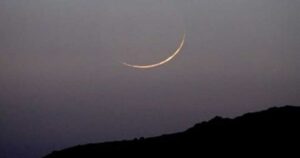Ramadan officially began in Pakistan after the moon was sighted, marking the start of the holy month of fasting for Muslims. The Central Ruet-e-Hilal Committee confirmed the sighting, and the announcement was made across the country. As a means of spiritual purification and closer relationship with Allah, Muslims in Pakistan will begin their fasts by abstaining from food, drink, and other physical needs from dawn to dusk.
With special prayers like Taraweeh held in mosques, Ramadan is a month of reflection, charity, and increased devotion. For millions of people all over the world, the sighting of the moon signals the beginning of a time of unity, faith, and worship. During this sacred time, Muslims are urged to do good deeds and seek forgiveness.
The Moon Sighting Tradition in Pakistan
Moon sightings are an important religious tradition for Muslims, marking the beginning of Ramadan and Eid-ul-Fitr. In Pakistan, the Central Ruet-e-Hilal Committee is responsible for determining the sighting of the new moon.

The committee, which consists of religious scholars, meteorologists, and other experts, meets in different cities, with the main session held in Karachi. Once the moon is sighted, an official announcement is made, and the start of Ramadan is confirmed. The sighting of the moon can sometimes vary depending on the region, leading to different dates being observed in various parts of the country.
Role of the Central Ruet-e-Hilal Committee
The Central Ruet-e-Hilal Committee plays a crucial role in ensuring the correct and unified start of Ramadan in Pakistan. The committee receives moon sighting reports from different areas, especially remote ones, where the moon might be visible earlier or later than in urban centers.
This process is essential to maintain uniformity in the observance of Ramadan. Although the Hijri calendar is based on lunar months, the sighting of the moon is often a matter of debate, as weather conditions and geographical differences can affect visibility. The committee’s decision is considered authoritative, and its announcements are broadcast on television and other media outlets.
Importance of Ramadan in Pakistan
Ramadan is one of the holiest months for Muslims, observed with reverence and devotion. The month is marked by fasting from dawn until sunset, charity, extra prayers, and spiritual reflection. In Pakistan, where the population is overwhelmingly Muslim, Ramadan is not only a religious obligation but also a time for family gatherings, community bonding, and charitable actions.

Muslims believe that fasting during Ramadan purifies the soul, teaches patience, and increases empathy for the less fortunate. As people adjust their routines to accommodate fasting, the country sees a transformation in daily life.
Fasting and Religious Observance
Fasting during Ramadan is one of the Five Pillars of Islam, which are fundamental practices for all Muslims. From dawn until sunset, Muslims refrain from eating, drinking, smoking, and engaging in sinful behavior. The daily fast is broken with the iftar meal at sunset, which traditionally begins with the eating of dates and water.
Suhoor, the pre-dawn meal, is also an essential part of Ramadan, as it provides nourishment for the day’s fast. In Pakistan, both the suhoor and iftar meals are family-oriented, and local food markets and bazaars are often bustling with people preparing for the evening meal.
Charity and Zakat during Ramadan
One of the central aspects of Ramadan is the giving of charity. Muslims are encouraged to increase acts of kindness, especially towards those in need, during this holy month. The practice of giving Zakat, a mandatory form of charity, is widely observed during Ramadan.

In Pakistan, many individuals and organizations distribute food, clothing, and other essential items to the poor and underprivileged. The spirit of giving and community support is prevalent, with many Pakistanis volunteering their time and resources to help others during this time.
Economic Impact of Ramadan
Ramadan has a significant economic impact in Pakistan, particularly in the retail and food sectors. Businesses adjust their hours to accommodate the changing schedules of fasting, and markets become busier, especially in the evenings, as people prepare for iftar. Restaurants, food vendors, and grocery stores see a spike in demand for items related to iftar and suhoor.
Many businesses offer special Ramadan deals, with discounts on items that are commonly used for fasting and feasting. However, for the poorer segments of the population, Ramadan can also bring financial strain, as families often struggle to meet the additional costs of preparing larger meals and giving charity.
Religious and Social Gatherings
Ramadan in Pakistan is not just about individual fasting but also about coming together as a community. Taraweeh prayers are offered in the congregation every night during Ramadan, and the mosques are filled with worshippers seeking spiritual solace. These prayers, which are provided after the Isha prayer, are a unique feature of Ramadan and are led by imams at mosques across the country.
Large social gatherings also occur, with families and friends coming together to break their fast at iftar, often in large banquets or at homes. The social significance of Ramadan cannot be overstated, as it fosters a sense of unity and shared purpose among Muslims in Pakistan.
Adjustments in Daily Life
Ramadan brings noticeable changes in daily life, particularly in work and school schedules. Office hours are typically shortened during Ramadan, with many businesses and government offices operating for fewer hours to allow employees time for fasting and prayer.

Schools may also adjust their schedules to accommodate fasting students. In cities like Karachi, Lahore, and Islamabad, special traffic arrangements are often made to ease congestion during iftar time. The month of Ramadan creates a unique rhythm in Pakistan, with the day beginning earlier for suhoor and extending later into the night due to tTaraweehprayers and iftar gatherings.
Cultural Celebrations and Festivities
Ramadan is also a time of cultural significance in Pakistan. The holy month is followed by the joyous celebration of Eid-ul-Fitr, the festival that marks the end of fasting. The festivities of Eid include special prayers, wearing new clothes, visiting friends and relatives, and giving Eidi (gifts, usually money) to children.
The excitement for Eid builds throughout Ramadan, with preparations for the holiday starting in the final days of fasting. Shops and markets are adorned with festive decorations, and people begin to plan their travels to spend Eid with family. The food traditions during Eid are significant, as people enjoy feasts with dishes that vary from region to region, including biryani, samosas, and sweet treats like mithai and kheer.
Government and Media Role
The Pakistani government plays an essential role in the smooth observance of Ramadan by ensuring that the moon’s sightings are accurately reported and that food prices are regulated. The government, through the Ministry of Religious Affairs, also ensures that mosques are prepared for Taraweeh prayers and other religious activities.

Media outlets play a key role in informing the public about moon sightings and providing guidance on religious practices during Ramadan. Television and radio stations often air special programs during the month, including religious sermons, news updates, and Ramadan-specific shows, to engage viewers and listeners.
Challenges and Opportunities during Ramadan
While Ramadan is a time of spiritual renewal and community bonding, it also brings several challenges. The hot summer months can make fasting physically demanding, particularly in regions with high temperatures and limited access to water. Additionally, the economic burden of preparing for Ramadan and Eid can be onerous for some families, particularly those already struggling financially.
However, Ramadan also presents opportunities for personal growth, community service, and strengthening of faith. Many Muslims in Pakistan use this time to reflect on their behavior, seek forgiveness, and make positive changes in their lives.
Frequently Asked Questions
When does Ramadan begin in Pakistan?
Ramadan begins after the sighting of the moon, officially announced by the Central Ruet-e-Hilal Committee.
What is the significance of Ramadan?
Ramadan is a month of fasting, prayer, charity, and reflection for Muslims worldwide.
How is the start of Ramadan confirmed?
The Central Ruet-e-Hilal Committee in Pakistan confirms the moon sighting.
What are the key practices during Ramadan?
Muslims fast from dawn until sunset, offer additional prayers (Taraweeh), and engage in charitable acts.
What time do Muslims begin their fast?
Fasting starts at dawn (Fajr) and ends at sunset (Maghrib).
Is there any special prayer during Ramadan?
Yes, Taraweeh prayers are performed at night, usually after the Isha prayer.
Why do Muslims fast in Ramadan?
To spiritually purify themselves, seek forgiveness, and strengthen their connection with Allah.
What is the role of charity during Ramadan?
Charity, especially Zakat (almsgiving), is an essential act of kindness and purification during Ramadan.
Does Ramadan change every year?
Yes, Ramadan shifts by about 10-12 days earlier each year in the Gregorian calendar.
How do Muslims celebrate Eid after Ramadan?
Eid al-Fitr marks the end of Ramadan with communal prayers, feasts, and giving to the less fortunate.
Conclusion
Ramadan started in Pakistan after the moon sighting, marking a month of fasting, prayer, and reflection. Muslims will observe fasting from dawn to sunset, engage in additional prayers like Taraweeh, and increase charitable acts. Ramadan is a time to purify oneself spiritually, seek forgiveness, and strengthen one’s faith. The end of Ramadan is celebrated with Eid al-Fitr, a day of joy, feasting, and giving. The start date varies each year due to the lunar calendar, but it is always a period of deep religious significance. The moon sighting marks the commencement of this holy month, and Muslims across Pakistan and the world are united in their devotion and commitment to these sacred practices.

